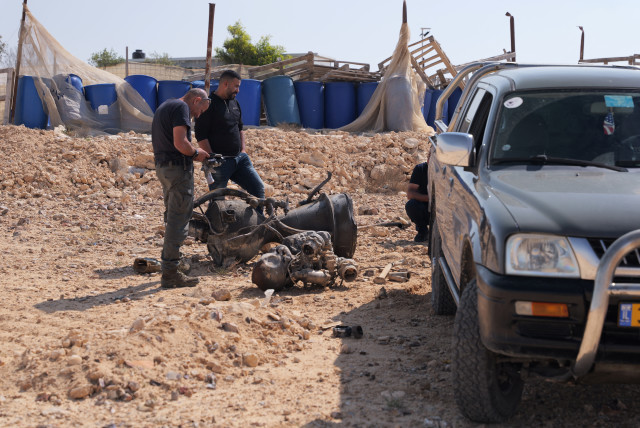Israel is at war again, but is safe due to tech advancements and collective faith - opinion

As we embark on this stage of our existential battle, we need your prayers now more than ever, so thank you for them; please keep them coming.
The news broke after Shabbat: “Iran has fired dozens of drones at Israel, and they could arrive in nine hours.” It seemed almost surreal. Iran had been threatening action since the beginning of the war, and now, due to Israel’s strike on one of their high-ranking generals, they had pulled the trigger. Later, there was an update: “The drones would arrive in two hours.” The suspense was almost too much to bear.
As nervous as I was, Shabbat had felt worse. All week there was talk of retaliation from Iran. At first I blew it off because this was far from the first threat – and all of the previous talk had led to nothing. But then on Thursday, all of the news agencies were reporting an imminent attack, within 48 hours. When nothing had occurred by candle lighting on Friday, turning off our phones felt like torture.
On most Sabbath days, I welcome the reprieve from devices. The break feels like exactly what I need – a time to focus on our family and community alone. I’ve often said that Judaism is going to save the human race because it forces us at least once a week to turn off the outside world and focus inward for 25 hours. But during times of war it’s not so simple: The fear of the unknown can be overwhelming.
Friday evening was riddled with nerves. I desperately wanted to know what was happening in other parts of the country. I knew it was quiet in my town but I was worried about my brothers and sisters on the other side of the hill in Tel Aviv, who I couldn’t see or hear from. I prayed everyone was safe.
“Abba! Come quick, I see rockets!” my son yelled from the porch after dinner. I was sure he was exaggerating because there were no sirens blaring, but he knows what they look like. We had traveled down South together at the beginning of the war to help a friend and we saw rockets overhead on our return home.
When I got outside, I saw them as well – two bright yellow lights in the sky, off in the distance. Although similar in color, these lights were different from what we’d seen down South. They had no trail and didn’t seem to be moving in any given direction. I couldn’t figure it out. “They might be headed right for us,” my son remarked. When my brother-in-law joined us, he told us they were mortars the army fires in the air when they’re conducting an operation. They must have been doing something in Bethlehem.
Crisis averted, for the moment
THIS WASN’T the first time we thought war had broken out on Shabbat. One Saturday morning during COVID in Jerusalem, my wife and I were roused by what could only be described as gunshots – lots of them. The noises were coming from every direction and seemed to be getting closer. I was sure Iran had invaded the country. I did the only thing I could think of to keep us safe: I put on my gun.
After what felt like an hour, I decided to try and understand what was going on. Across the street from our former residence was an old-age home staffed by many non-Jews. If anyone could figure out what was happening on Shabbat, it had to be them.
As I walked to the back of the building, I ran into one of the Arab workers and asked she knew what was going on. She seemed slightly embarrassed. “The high school students in east Jerusalem got their matriculation scores this morning. They’re celebrating.” My mind immediately jumped to the Looney Toons cartoons I used to watch, where Speedy Gonzales would shoot his guns in the air on every episode. “I’m so sorry,” she said. I told her she had nothing to apologize for and thanked her profusely for her help. At least now I could rest.
But this past Shabbat in Efrat, our new home, was different. The overwhelming majority of the population is not only Jewish, but observant. If war were to break out, we’d have no access to the outside world. So everyone nervously talked about the approaching attack at the Shabbat morning kiddush, and whether something might have happened, but no one had any new information. In truth, I still can’t believe Iran didn’t violate our holy day, as so many other of Israel’s wars have begun in that way.
AT 1:45 on Sunday morning, the sirens began to blare. It felt like the entire country was running for shelter. We grabbed our children and slammed the safe-room door closed. We were scared, as expected. We went from praying for those in the North and South when our applications told us rockets were raining down there, to praying for ourselves as well. We heard many explosions in the distance, only this time we knew what they were, where they had come from, and what they meant. After 10 minutes, we emerged from the safe room, unscathed.
As it turned out, Iran did not just fire drones – 200 were drones, but 110 were ballistic missiles and 30 were cruise missiles – and 99% of them were shot down. This is nothing less than a miracle.
There’s no doubt that the safety of the overwhelming majority of Israel’s citizens is due to our technological advancements. But there are two additional things to keep in mind. None of this would have been possible without God’s help and the prayers from around the world.
As we embark on this stage of our existential battle, we need your prayers now more than ever. Thank you for them; please keep them coming.
The writer is a rabbi, a wedding officiant, and a mohel who performs britot (ritual circumcisions) and conversions worldwide. Based in Efrat, he is the founder of Magen HaBrit, an organization protecting the practice of brit milah and the children who undergo it.
Jerusalem Post Store
`; document.getElementById("linkPremium").innerHTML = cont; var divWithLink = document.getElementById("premium-link"); if (divWithLink !== null && divWithLink !== 'undefined') { divWithLink.style.border = "solid 1px #cb0f3e"; divWithLink.style.textAlign = "center"; divWithLink.style.marginBottom = "15px"; divWithLink.style.marginTop = "15px"; divWithLink.style.width = "100%"; divWithLink.style.backgroundColor = "#122952"; divWithLink.style.color = "#ffffff"; divWithLink.style.lineHeight = "1.5"; } } (function (v, i) { });

